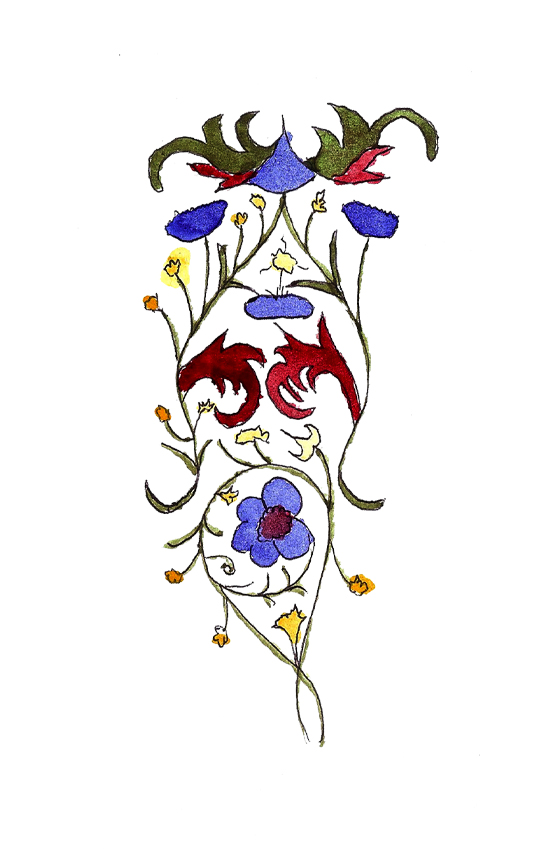When writing a poem, understand that there’s no lesson that will teach you how to write a poem. If you want to write a poem, start by reading poetry. I mean it. Start reading poetry now. The best way to feel your way into a poem is to read other poets. Go read a poem by Emily Dickinson; read a Shakespeare sonnet, something by Allen Ginsberg, the letters of Arthur Rimbaud; read Han Shan, Pablo Neruda, read Chaucer and Dante, read old grocery lists, read the prose of W.G. Sebald; watch a half dozen Werner Herzog films and report back to the blank page.
As you read more widely, you’ll learn more about the kinds of poetry that inspire you. These are the poets and poetry books you’ll need to keep on your desk when you set out to write. Also, memorize poetry. It helps to have lines jangling around in your head when you’re trying to get into a rhythm on the page. Read prose, fiction, magazine articles, porn, twitter. You are a language processing machine. If you look closely at the plays of William Shakespeare you’ll see how he re-used and re-processed language from various social domains. In the work of Shakespeare you find the language of accountants, lawyers, doctors, pharmacists, priests, fools, merchants, kings, commoners, and more. This is what makes William Shakespeare so good. He was able to take those registers and wield them to his uses. Read voraciously before you set down to write. If, after you’ve read a good hundred or so poems, you still feel the urge to write one of your own, here are some other things to keep in mind:
- Learn grammar. Learn punctuation. Every poet who doesn’t use punctuation knows how to use punctuation. Get a good grammar book. Hire an editor to fix your grammar mistakes. Learn how to use a comma, semi-colon, parenthesis, and period. You can’t do anything innovative with language if you don’t know how the language actually works. You can’t break the language if you don’t know how the language functions.
- Describe things in the world, not feelings or abstractions. Avoid the word “love.” Your job as a poet is to describe the tree so vividly, only you could have been the one to describe that particular tree. The tree might make someone feel sad, lonely, or nostalgic, but your job isn’t to write about sadness, loneliness, or nostalgia. Your job is to describe the fucking tree.
- Be delusional. You’ll write many bad poems before you write a good one. Writing poetry or creating anything for that manner is a process of deluding yourself that someday you can be good. Pick the poems you love and set them as your standard. Imitate them. Imitate them over and over. Even in imitation your own voice will start to ring through. When you write one original line, one good line, you’ll know it because you’ll feel it. Trust that feeling. That feeling is your touchstone.
- Write poetry from your perspective and from your time and place. Don’t try to be Arthur Rimbaud. He’s dead. Or, if you are trying to be Arthur Rimbaud, make sure you invoke his ghost, and have a nice drink of absinthe before you do anything.
- Write every single day, without exception. When I started writing poetry, I was in high school. I woke up at 6 in the morning, had to go to school all day, and I had an after-school job where I took care of elementary school kids for three hours. I needed this job to save up for college because my parents weren’t going to pay for college. Then, I came home and had to do all my AP homework (because, again, I wanted to go to college). At maybe around 10 p.m. or 11 p.m. at night I finally had a free moment to write poetry. This was my sacred hour. I wrote without fail. Find your sacred hour. Write without fail.
- Poets are those who write poetry, but they also do other things. They teach, they surf, they rock climb, they get lost in the woods, they build cabins in the woods, they plant gardenias, they make pottery, they paint, they raise children, they work as accountants and librarians. Don’t think you’ll be able to just be a poet, unless you’re Oprah-rich. (If you’re Oprah-rich, you can be whatever you want.) Fuck it. I wish I was Oprah-rich.
- You don’t need to get an MFA, unless you’ve gotten into an MFA program that will pay you to study and write poetry for two years. If that’s the case, do the MFA. Don’t make the mistake I made of getting into mountains of debt for an MFA. The MFA won’t really make a difference, unless your goal is to be a professor of poetry, in which case, your MFA still probably won’t make a difference, because there are maybe 6 tenure track jobs for poetry in the whole nation. If your poetry professors really like you, they might connect you with a good editor who might publish your work or maybe they’ll get you an adjunct job that pays 14K a year to teach the same course-load expected of a tenure-track professor. That said, you probably don’t want your poetry professors to like you (not too much at least).
- Tell the truth. Tell the truth. Tell the truth. Otherwise, what the fuck are you doing?

- Poetry can be written in meter, in rhyme, in form, outside of form, in defiance of form, in pictorial form, in voice, in prose, or over a painting. Try writing in every form possible. See where it takes you. Then, abandon form. Or create your own.
- Sit in front of paintings. Write poems about what you see. Do this often. Do this daily if you can.
- At some point, you will need to learn to write to the end of the page. I repeat. At some point, you will need to learn to write to the end of the page.
- Make friends (but not all of them poets). You’ll need your poet friends to read your poetry and complain about how no one reads poetry. Your real friends will be Alaskan fishermen. Or sailors. Or shoemakers. Or astrophysicists. Or bartenders. Or surfers. Or rock climbers. Or that guy on the corner asking for change.
- Your voice is the voice that comes when you’re trying to do something else. When you’re trying to imitate Auden, or trying to be Wallace Stevens, or when you’re writing that angry e-mail to your son’s first grade teacher; your voice is the undeniable constant that drives your syntax and descriptions forward. Your voice is your obsessions. Figure out what you’re up to and then do it more.
- Submit your poem to magazines. You’ll get rejected. A lot. It will keep you humble. Don’t get discouraged. Everyone with a pencil can be a poet and magazines get a lot of submissions. Keep trying. Eventually, something will stick. Remember that most editors get hundreds of poems sent their way each day (I know, I saw the mountains of mail at the New Yorker.) If your poem was rejected it more often has to do with exhaustion or a bad lunch burrito and probably nothing to do with your work.
- Have fun; it’s all you’ve got. Poetry doesn’t pay (unless you’re Billy Collins or Rupi Kaur). Damn it, I wish I could be Rupi Kaur right now.
At some point I might improve upon this list. As of today, I stand by it. Write poems. Share them. We need them now more than anything.
About the Writer
Janice Greenwood is a writer, surfer, and poet. She holds an M.F.A. in poetry and creative writing from Columbia University.

